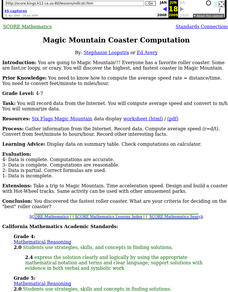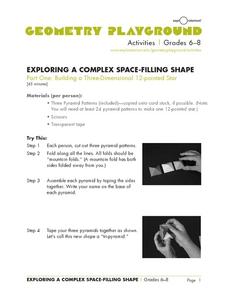Montana State University
Sea Floor to Summit
Who knew that mountain formation could be so entertaining? Leanr how mountains form with a resource on Mount Everest. Activities to guide learning include a simulation, project, videos, coloring activities, and worksheets.
Montana State University
Ice in Action
Make your own bite-size glacier! A resource teaches about the formation and melting of ice. Activities include videos, a hands-on activity where your pupils build glaciers, and a photographic analysis to teach individuals the chilling...
Curated OER
Mountain Building
Teacher prepares four layers of Plasticine stacking layers on top of each other to create a model of how rocks within the earth can be folded creating anticlines and synclines below the surface and mountains and valleys on the surface.
Curated OER
Mountains "Fold, Fault, Erupt, and Erode"
Fifth graders conduct an experiment to demonstrate the folding and rippling of rock to form a mountain. They identify mountain chains on a map, participate in the demonstrations, and define folding fault block, igneous eruptions, igneous...
Curated OER
Carving Mountains
Students explore geography by participating in an illustration activity. For this land-form lesson, students define vocabulary terms associated with glaciers and forests. Students utilize pens, cardboard and pottery clay to draw and...
Montana State University
Climb into Action!
Climate change affects even the largest and intimidating of landforms—even Mount Everest! A resource helps teach learners the connection between global climate change and its effects on Earth. Activities include videos, class discussion,...
Montana State University
Meet Mount Everest
Learning about one landform might seem boring to some, but using the resource provided practically guarantees scholar interest. The second in a sequential series of eight covering the topic of Mount Everest includes activities such as a...
Curated OER
Coal Derivatives by Destructive Distillation
Chemists use the destructive distillation technique to produce three derivatives from a sample of bituminous coal. You will find background information, a materials list, procedures, and sample follow-up questions that you can use in...
Curated OER
Carve That Mountain
Learners investigate major landforms (e.g., mountains, rivers, plains, hills, oceans and plateaus). They build a three-dimensional model of a landscape depicting several of these landforms. Once they have built their model, they act as...
Curated OER
Coal Derivatives
Learners use this hands-on activity to demonstrate the production of coke, one of the most widely used raw materials derived from coal. They are also stimulated to do research into the differences in coal types and coal products.
Montana State University
What's the Weather?
How many jackets do you need to stay warm and climb Mount Everest? An informatie resource covers the topic of Mount Everest, the resource helps young scientists discover the difference between climate and weather. Activities include...
Curated OER
Hands on Biome--Building
Students create a model biome. In this ecology lesson, students use materials to create a model biome. There is an extension activity that allows students to write about plants and animals and their specific biome.
Curated OER
To Protect Your Streams, Protect Your Mountains
Students build and experiment with a watershed to understand the effects of pollution. In this movement of water instructional activity, students work in groups creating rock formations and change the viscosity of the liquids falling...
Curated OER
Building a Better Sentence
Sentence construction is both a science and an art. This bare bones lesson ties an analysis of earth's geology to sentence formation. Although referenced as a major part of the activity, there are no links to the technology or resources...
Curated OER
Hands on Biome-Building
Students explore Earth science by participating in an environment activity. In this biome lesson, students discuss the importance of a healthy ecology in order to sustain life, both animal and plant. Students utilize a cardboard or wood...
Curated OER
Bhutan, the Last Shangri-La: Sandwich Squash: How the Himalayas Were Formed
Pupils create and record a model of mountain formation. They identify major mountain building formations. Students understand how the Himalaya Mountains were formed, why they are located near Bhutan, and why they are becoming larger.
Curated OER
Mountain Building
Fourth graders identify variables that influence rates of change. They, through group consensus and using the assigned materials, design and build what they believe to be the strongest mountain possible.
Curated OER
Build a Rain Gauge
Students use a glass container, coat hanger, measuring spoons, and more to make their own rain gauge. In this rain gauge lesson plan students measure the rain.
Curated OER
Hazards: Kindergarten Lesson Plans and Activities
The last unit in the series allows kindergarteners to see the dangers and hazards associated with each of the natural disasters learned so far in the series—earthquakes and volcanoes. They listen to sounds associated with the...
Curated OER
Lost Worlds
Students, while using the strategy of identifying the main idea and supporting details, explore the three nonfiction selections of the lost worlds of Machu Picchu high in the Andes Mountains, Great Zimbabwe, and Anasazi. In addition,...
Science 4 Inquiry
Edible Plate Tectonics
Many people think they can't observe plate tectonics, but thanks to GPS, we know that Australia moves at a rate of 2.7 inches per year, North America at 1 inches per year, and the Pacific plate at more than 3 inches per year! Scholars...
Curated OER
Build an Ice Cap
Students research Earth science by conducting an experiment in class. In this ice-cap lesson, students identify what an ice cap is and create a biome using a box which measures 1 ft. x 1 ft. Students participate in an animal role-playing...
Curated OER
Magic Mountain Coaster Computation
Learners use the Internet to do research on the roller coasters at Magic Mountain Amusement Park. They must use mathematical formulas to calculate the highest and fastest coaster at the park.
Exploratorium
Exploring a Complex Space-Filling Shape
Middle schoolers build a three-dimensional 12-pointed star as a geometric exercise. The shape is quite-difficult to construct. Luckily there is an excellent template that learners cut out, then use to make their pyramid. The second part...























